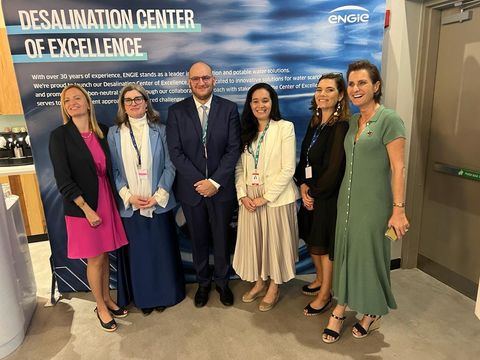COP28: ENGIE & CCI France UAE TakeAways: “Rethinking Desalination Technology” - 10 December

Aligned with COP28’s “Food, Agriculture, and Water” Thematic Day, our team at #CCI France UAE, in collaboration with #ENGIE, was thrilled to contribute to the “Rethinking Desalination Technology” panel at the ENGIE Offices in the COP28 Green Zone. This was complemented by ENGIE's launch of its “Desalination Centre of Excellence”.
🤝 The panel emphasized desalination's potential in combating water scarcity, sharing knowledge on the latest technological advancements in the GCC region. We acknowledged the longstanding importance of desalination as a primary source of drinking water in our GCC arid areas, crucial for sustaining life and economic progress in the Gulf Region.
Engaging discussions were led by global leaders in energy and water solutions, including ENGIE's Head of Desalination Centre of Excellence, Latifa LAHSINE, EUPHRATES ENERGIES SAS’s Director, Pia BOYER, and # LABORELEC’s Desalination Expert, Daniel BAAKLINI, under the adept moderation of #Elise d’EPENOUX.
🙌 Our KeyTakeaways in Adressing Water Scarcity :
1. Technology-Led Solutions: ENGIE’s innovative approach to advanced water desalination facilities, emphasizing circularity, waste and brine management, and CO2 emission reduction, highlights their commitment to sustainable desalination practices. Long-term vision for water desalination. ENGIE Mantra : “Together lets UNITE, ACT and DELIVER”.
2. Advancing Brine Mining: Focusing on the Arabian Gulf's unique arid environment, EUPHRATES ENERGIES' "Brine Valorization" initiative showcases how brine mining can complement MLD/ZLD strategies using advanced technologies like electrolysers and filtration to create value from waste effluent, with a focus on cogeneration, to generate molecules like hydrogen and acids that can be used in the operations of large scale plants.
3. Current Desalination Landscape in the GCC: Transition from thermal to reverse osmosis processes, integration with renewable energy sources; ENGIE’s positioning in the large-scale plant market.
4. Market Evolution: Increasing focus on environmental impacts, lender requirements; Highlights on environment impacts: brine management, coral protection, and biodiversity conservation.
5. Short-Term Improvements: Key areas in seawater desalination including energy efficiency, membrane technology, and chemical use.
6. Long-Term Vision: Aiming for low energy, high flux desalination processes, achieving ZLD/MLD standards, and minimizing chemical dependency.
✨ Sustainable Desalination: The future of desalination technology is not just promising—Solutions are already here. The path to sustainable desalination is distinctly mapped out, and these solutions are well within our Grasp ! 🌍
👥 Special thanks to Phillippa EASTGATE, Lisa WEBBER, Elsa HDAYA, Merciana LOPEZ and the outstanding team at ENGIE for their impeccable organization of this insightful panel.




